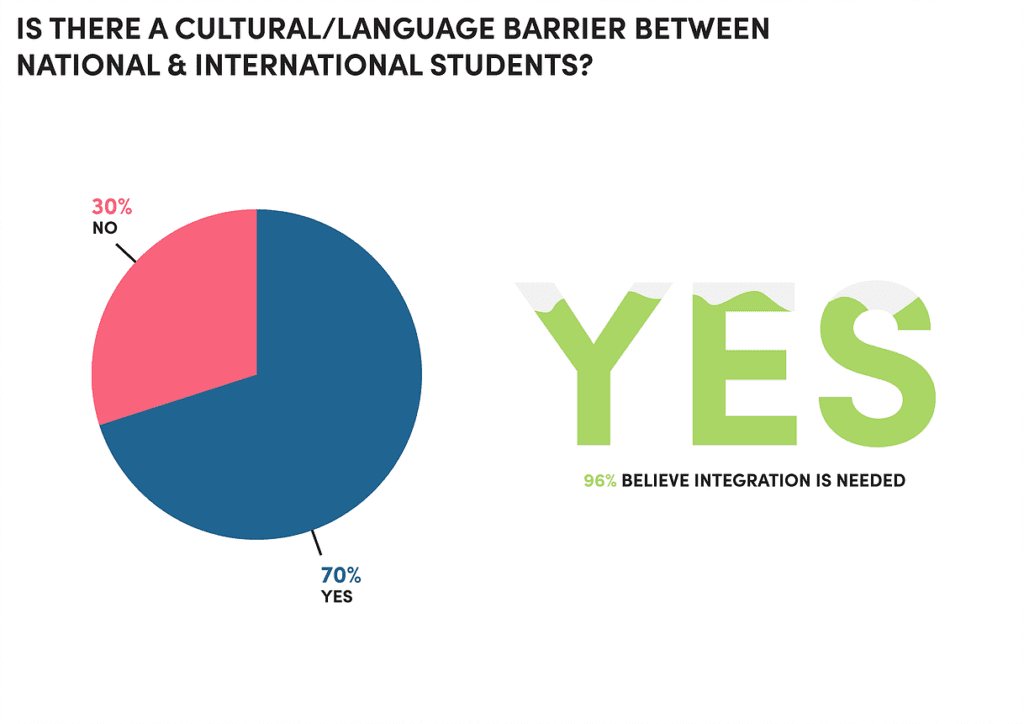Diversity is a good thing, or so it would seem. IE University boasts an international reputation for attracting some of the brightest minds from all corners of the globe, and putting them all together in a classroom to think, philosophize, learn, and grow. But with all these different cultures, nationalities, and languages colliding, what happens to the inevitable potential for conflict? Is it true that a whole shipment of international students can arrive in Spain and seamlessly fit in with Spanish nationals also seeking their higher education?
This week, The Stork delved into the issue, starting with a small, random sample of 92 undergraduate students on the Madrid campus, who were asked to fill out a brief and anonymous survey inquiring about their experiences at IE. Of this sample, 55% identified as international students, and the rest identified as Spanish, giving a decently fair view to opinions on both sides. The survey aimed to identify popular attitudes, and the results were staggering, revealing polemic within the student body.
DISCLAIMER: To preserve the anonymity of respondents, the circulated survey asked only for personal identification based on degree, ignoring factors like year of study, age, and gender
To begin, 70% of respondents collectively reported that they felt a language/cultural barrier exists between international students and Spanish students at IE.
Consequently, 88% noted a remarkable difference between being in a class with mainly Spanish students, in contrast to being in one with mostly internationals. When asked to elaborate, the answers were overwhelming, with people from all nationalities claiming the same trends of insufficient language levels from both sides, and varying work skills. Mild answers, such as,
“As a Spanish person, I feel being in a class surrounded by Spanish people is less enriching because we share a quite similar way of thinking,”
were countered by more extreme complaints.

“In our classes with a Spanish majority, they almost always disrupt the class the entire time, and don’t face repercussion”,
said one anonymous respondent, and they were not alone in their sentiment. In fact, the overwhelming majority of the short answers given by students in response to the aforementioned question made reference to disruption levels and problems of discipline.
One respondent even went so far as to say that,
“The Spanish students are given as many free passes as they want”,
echoing others who claimed that being a non-Spanish speaker led to “exclusion from conversations, but also debates in class,” and a loss of respect from peers and teachers based on language abilities.
Reports of group-ism, exclusion, and rivalry, both socially and academically, were not uncommon, and the apparent unifying thread was a decrease in the international essence that IE tries its best to offer. Respondents even went so far as to brought to attention that they have had teachers who would assign material in Spanish, or teach part of their lectures in Spanish, excluding those who cannot understand the language.
When asked if they felt as if they had been integrated into Spanish culture, 78% of international students responded NO, but perhaps this is not as surprising as it may seem; the university prides itself in being a hub for the international, rather than an extension of the traditional Spanish education system.
However, this does not equate to a divided school in which there is no integration between national students and foreigners. Ultimately, 97% of respondents felt that Spanish and international students could and should be more integrated within the university itself.
As one anonymous respondent so eloquently put it,
“A class with students from a variety of backgrounds benefits from more diverse perspectives and insights.”
Expanding the random sample, over 75% of the student population are currently unsatisfied with the makeup of their classes, unsurprising based on the high level of divisions reported.
What is the biggest shame is that from all the respondents questioned, 68% of people states that part of their motivation to study at IE was the immersion into other, diverse cultures, something that is clearly lacking, and obviously felt amongst students. As any IE student can tell you, diversity, without proper integrative efforts, can lead to cleavages along cultural, religious, and ideological lines, and it is clear that a university environment is no exception.
The results have been fascinating, and bring more questions than answers: Are divisions really based on nationality, or is language the biggest factor involved? What do specific students from both sides of the coin have to say about this? What do visiting students think? Do teachers notice a difference in a mostly Spanish or mostly international group?
Join us next week as The Stork continues its investigation into the secrets of our international conglomeration of a student body!







